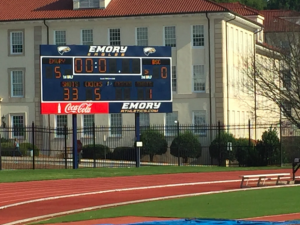This past Sunday, we decided to venture into the world of sports here at Emory. As we stepped onto the scorching hot metal bleachers, we initially noticed spectators holding sun umbrellas with iced cold drinks in-hand to cool down. We, on the other hand, were suffering tremendously. As we wiped rivulets of sweat off our dripping faces, we wondered: “How can these players be compensating so well in this heat?!” Both the Emory Soccer team, along with Birmingham-Southern College’s team, were dressed in their thick T-shirts, long shorts, and high knee socks – the sweat and pressure was on for these women. Yet, as temperatures had risen, our team only progressed more, persevering through the treacherous heat. Throughout the first half of the game, we began to recognize the mutual dedication between not only the players, but the fans watching the game as well. The juxtaposition between the players, field, and their communicative strategies was quite harmonious. During half-time, we decided to interview some fans of the team, in order to gain insight on their personal dedication for coming out to watch.

We commenced our interviews by asking a woman in-line at the vending machine of her reasoning for attending the game. We initially explained our blog post idea, as “trying to gain insight on players and spectators dedication to the game.” She seemed intrigued, and gladly obliged to assist us.
“Are you a parent here?” We began asking.
“Yes,” she replied. “I’m visiting my daughter this weekend, and it’s really cool to see her play in person. We usually have to watch her games on the computer, since we’re from Chicago. I’ve been watching her games ever since she was five – because that’s just what parents do!”
Susie, mother of a third-year student here at Emory, seemed to be tremendously committed to her daughter’s soccer, even throughout her duration of college. After speaking with her, we watched in the stands how she called out and cheered for her daughter immensely. It was clear how as a mother, she deems her daughter’s sports career to be of utmost importance. She exuded an intrinsic motivation to come out and support her kin, just as any loved one should.
We then noticed a twenty-something year old woman purchasing an iced cold water bottle. Again, introducing our idea, we started off by asking what her purpose for attending this game was. After we introduced ourselves, Jessie, amidst her mother Nancy, began to explain her prior experience with the sport:
“I actually played for the Women’s Soccer team at BSC all throughout college,” said Jessie. “I’m from Kennesaw and now live in Augusta, so I decided to come out and watch.”
“How did you feel your dedication to the sport interfered with your studies?” We then asked.
“I mean, D3 is a good balance between academics and sports,” she started, “but we usually had practice every day though – around 2 ½ hours. If you were just a runner, you’d only have to practice 1 ½ hours, the length of a game. We also played Emory every season… and I actually tore my ACL playing here. It’s my second year out of school and I try to watch the games every chance I get.”
As we stepped away from Jessie and her mother, we reminisced upon each individual’s similar yet contrasting motivation for being here: While we show a desire to gain perspective, others come to support their loved ones, while most come to give encouragement for their past teammates.

After stepping inside to cool off, we entered the second half of the game. Just a few minutes in, our focus began to wander away from the soccer players to the conversations of the zealous relatives who sat behind.
“Go DeDe!” One man proclaimed as his daughter’s teammate finally scored a goal. “SHOOT!” He yelled out. “As much as she’s been working – she deserved that one [shot]. If she was old enough I’d buy her a drink!”
The comment elicited bountiful laughter from those nearby, and immediately our eyes fell upon the soccer player, DeDe, who continued to play with unabating enthusiasm despite the unrelenting Georgia heat. Perseverance was evident among all the lady Eagle soccer players, which got us thinking about how interconnectivity between dedication and perseverance applies to life here at Emory.
Just as injuries and weather conditions can serve as obstacles in a soccer game, the road to achieving our aspirations may lead to many hardships. Having a set goal in mind that one is passionate about makes obstructions that arise in our paths worthwhile, and the gratification received from achieving our dreams tenfold.
It would be hard to imagine the nosebleeds and torn ACLs these soccer players endure are to no avail. Even amidst the most crucial moments of the game, it was clear that women were willing to sacrifice themselves for the benefit of their team. Although such selfless and diligent behavior may put players at risk physically, having their family and friends there to provide support has ultimately assisted their drive to win.
Throughout the duration of the second half, we interviewed Kettly, a mother sitting next to us in the stands:
“Have you been a fan of the team for a while?” We asked.
She began by telling us: “I’ve been a fan of the team since my daughter, a junior, joined [the team] in her freshman year.”
We followed up with asking if she was from around here, and how often she has attended the games: “We are from Tampa,” Kettly followed up, “which is a seven hour drive away. I try to make it to as many home games as I can.”
“Has the team been doing well so far?” We concluded.
“A couple of seniors graduated from the team last year,” said Kettly, “and we have lost a few games. But the team has been doing well, and it is always good to watch.”
About five minutes after we interviewed Kettly, her daughter, Danielle, scored the fourth goal in what eventually lead to a 5-0 demolishment of BSC. We made sure to congratulate Danielle after the game. On the walk back to our respective dorms, we reflected upon the underlying theme that paralleled the lives of Emory athletes and students not committed to sports.

Whether you are a spectator or player, individuals congruently share some form of intrinsic motivation throughout their lives. As many students of Emory arrive with a drive to succeed academically, a vast majority of student athletes are forced to give up the development of other aspects of their lives. How much are you willing to sacrifice to achieve your goals? ⚽️
Jenna Gursky, Josh Maisel & Rachel McNeil
